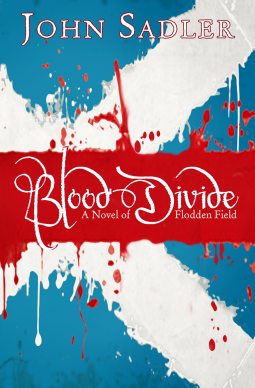
Publication Date: January 27, 2015 Lion Fiction Paperback; 352p ISBN: 978-1782640899
Genre:
Historical Fiction
Gripping, visceral, and accessible historical fiction. The Battle of Flodden in September 1513 was one of the bloodiest battles ever fought on British soil, in which James IV, King of Scots, and virtually the whole of his nobility and gentry were annihilated in an afternoon along with 15,000 soldiers. Five centuries later, the slaughter still occupies a core position in the Scottish nationalist debate and in the pantheon of heroic failures. This novel puts you in the heart of the action; youíll feel the sweat and the fear, the curtain of red mist. The narrative covers April through September 1513, focusing around a handful of key characters: John Heron, Bastard of Ford, swaggering, violent, and disreputable, the black sheep of a good English family; Sir Thomas Howard, leader of the English forces and skilled strategist; Alexander, 3rd Lord Hume, leader of the Scots, bold but impetuous; Isabella Hoppringle, Abbess of Coldstream, hub of a web of influential women throughout the Scottish borders, a woman of significant influence and charisma. Laced with dark humor and fascinating period detail, Blood Divide reminder readers that political intrigue and human folly are timeless.
Buy the Book
Amazon Barnes & Noble Kregel Publications
About the Author
John Sadler is an experienced military historian, a fellow of the Royal Historical Society, and the author of more than two dozen books. He is also a much traveled battlefield tour guide covering most major conflicts in the UK, Europe, and North Africa.
For more information please visit John Sadler's website.
Blood Divide: A Novel of Flodden Field Blog Tour Schedule
Monday, January 26 Review at Ageless Pages Reviews Spotlight & Giveaway at Let Them Read BooksTuesday, January 27 Review at Flashlight Commentary
Wednesday, January 28 Spotlight & Giveaway at Historical Fiction Connection
Friday, January 30 Spotlight at Layered Pages
Sunday, February 1 Spotlight & Giveaway at Teddy Rose Book Reviews Plus More
Monday, February 2 Review at Book Lovers Paradise
Tuesday, February 3 Spotlight & Giveaway at Words and Peace
Thursday, February 5 Interview and Review at A Virtual Hobby Store and Coffee Haus
Saturday, February 6 Review at Book Nerd
Monday, February 9 Review at Just One More Chapter
Tuesday, February 10 Review at Broken Teepee Spotlight at Historical Fiction Obsession
Wednesday, February 11 Review at Forever Ashley Review at The Mad Reviewer Spotlight at CelticLady's Reviews
Thursday, February 12 Interview at Books and Benches
Friday, February 13 Spotlight at Caroline Wilson Writes

I WAS SUPPOSED TO WRITE A REVIEW, HOWEVER, I JUST RECEIVED THE BOOK AND HAVEN'T HAD AN OPPORTUNITY TO FINISH. AS SOON AS I HAVE I WILL POST MY REVIEW ON THIS BLOG AND ON AMAZON, GOODREADS, AND BN. IN THE MEANTIME, WE HAVE A GUEST POST FROM MR. JOHN SADLER, AUTHOR OF BLOOD DIVIDE.
Flodden Blog – Death of the King
On a blustery afternoon in late summer five hundred years ago this September 9th the largest army Scotland had ever deployed against England lined Branxton Edge in North Northumberland. In the shallow valley before them stood an English force under the Earl of Surrey, his eldest surviving son Thomas Howard the Lord Admiral with the gentry and commons of the north. Everyone had been here before. Since the days of Edward III the Northern English had been expected to fend for themselves against Scottish aggression triggered by English attacks on Scotland’s ally France, dancing to the tune of the ‘Auld Alliance’.
It would be a very brave man indeed who, looking up at the ridge as the squally showers abated and a fitful, wind-laced light shone through the grayness, did not quail. The long lines of Scottish pikes, arranged in the new, fashionable continental manner must have truly seemed like Birnam Wood. Perhaps as many as thirty thousand men crowned the high ground, their eighteen foot staves rearing like a steel tipped avalanche, ready to deluge the far fewer English below, to sweep them aside and clear the road to Scotland. Howard’s masterly flank march humbugging the Scottish king and placing his underfed forces between the Scots and the Tweed had been a masterstroke but it could still end in disaster.
Amongst the gaudy silk splendour of the massed Scottish banners, firefly bright against the damp ochre of Northumbrian earth, flew the proud flag of King James IV. Since acceding to a vacant throne after the convenient murder of his unloved father James had ruled for quarter of a century. His reign had been marked by increasing stability and centralisation, firm and efficient government, prosperity and growth. The King was truly a fit renaissance prince with a wide sprawl of interests including, perhaps alarmingly for his courtiers, dentistry. He had built a state of the art navy, fit to rival that of his brother in law Henry VIII. James had indeed accomplished much.
He wanted more. He needed to put his hitherto remote realm into the cockpit of European power politics, to strut the wider stage, to be heard despite the tumult of unceasing wars between France and the Empire. Henry VIII had very similar ideas and, courtesy of his parsimonious father, a full treasury. James, above all, wanted to prove himself in the crucible of kingship – the battlefield. It was by his will that these two great armies now confronted each other; the Scots artillery train, one of the most formidable in Europe about to begin the battle.
The King of Scotland has been roundly condemned for the disaster which followed. His heavy guns, attempting to fire downhill, were raked by lighter, better handled English field pieces. With the counter battery fire working so well for the home side, the massive Scots pike columns were soon feeling the effect. James’ half-trained levies were not prepared for such fearful attrition and the King, true to prevailing Swiss doctrine, launched an immediate attack.
At first all went well, the flimsy English right under Edmund Howard was swept aside by Home and Huntly’s division. Home’s opposite number, the English warden Lord Dacre, threw his border riders in to stem the rot and the fight ended in stalemate. The central Scots’ phalanx, with the King’s massive division on their right stormed down the slope, seemingly unstoppable. But James was an amateur; he had failed to reconnoitre the ground, an error no Swiss general would have allowed. The rush was spoilt by wet ground and the battle became a footslogger’s struggle with the English bill proving vastly superior.
By the dismal close of the wet afternoon, as light thickened the body of King James IV lay unnoticed amongst piles of dead and dying, hacked by English blades. He would not be taking his place on the wider stage.
Why write about this? Twice I’ve written non-fiction accounts of Flodden. Such writing is inevitably constrained by the known historical facts. These are contained within primary sources which, for the battle, are very sketchy. I have lived in Northumberland for all of my life and have enjoyed a lifelong fascination with the area, it’s unique and compelling landscapes, a long and, it has to be said, bloody history, forged in the cauldron of three centuries of bitter warfare with the Scots.
My objective in turning to fiction was to attempt to bring the era to life, to explore character in a way that history simply doesn’t allow. All of the four narrators in the book are based on real individuals. Two are public figures in the sense that far more is known of their lives than the other two, Heron and Isabella, both of whom appear only as footnotes. These two are pivotal, each is known to the other and both are significant ‘players’ in the events of the campaign. Heron is a writer’s gift, a homespun D’Artagnan. No plaster saint to be sure, outlaw, killer, thief and (probably) spy. His world is one of violence and anarchy to a degree we can barely comprehend. Individual actions are conditioned by the survival reflex, untrammeled by any veneers of civilized restraint. At the same time they were free and unconstrained in a way we equally cannot grasp.
No comments:
Post a Comment